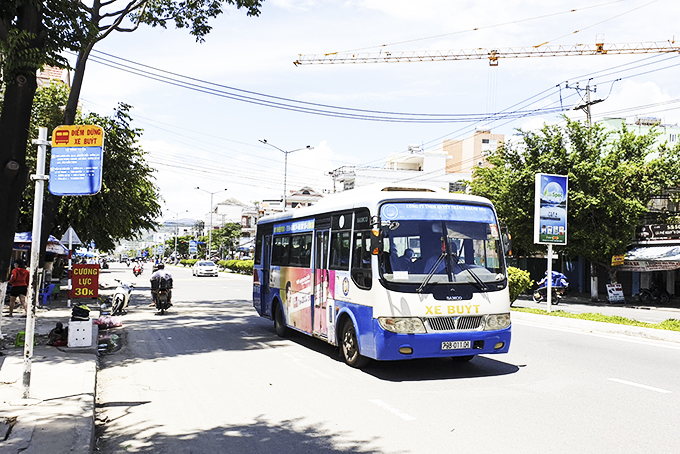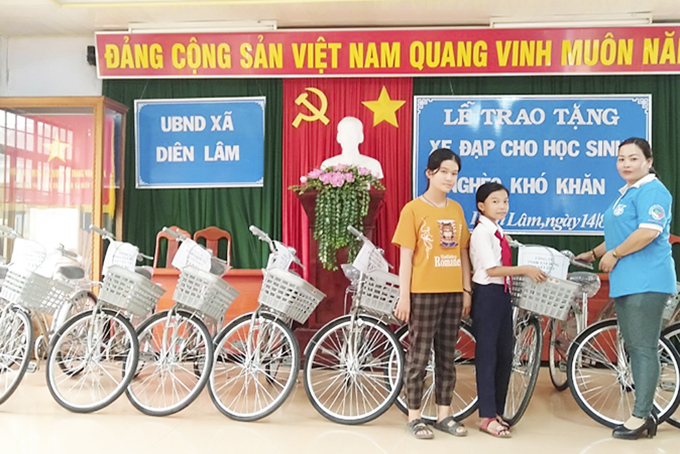
The bus network in the province has helped facilitate travel for local residents over years. However, the bus operation has recently faced challenges, requiring a breakthrough in mechanisms and orientations for development...
The bus network in the province has helped facilitate travel for local residents over years. However, the bus operation has recently faced challenges, requiring a breakthrough in mechanisms and orientations for development.
Reducing the use of private vehicles
The bus network in the province currently has 16 routes, including 6 inner Nha Trang City, 9 inter-district routes and 1 inter-provincial route. 6 bus routes in Nha Trang City are operated by Quyet Thang Khanh Hoa Co., Ltd with 44 buses running within 300 - 700m distance between stops. 9 inter-area bus routes with an average distance of 20 - 60km serve the travel from districts and communes to Nha Trang City. In particular, there are also routes serving travel in remote areas such as Khanh Vinh, Khanh Binh and Ninh Tay. The inter-provincial bus route has 20 vehicles serving the 2 provinces of Khanh Hoa and Phu Yen. Reportedly, buses in Khanh Hoa Province carry nearly 2 million passengers/ year on average.

|
In recent years, the public bus transport has helped reduce road crash and environmental pollution; limit the use of private vehicles (especially non-motorized modes of transport); save social costs and student pick-up or drop-off time; reduce traffic congestion and ensure traffic control, contributing to the implementation of the Government's Resolution No. 32 on urgent solutions to curb traffic accidents and congestions, according to the leader of the Department of Transportation.
Preferential offer
In 2018, the Department of Transport coordinated with relevant departments and agencies to provide consultancy for Khanh Hoa Provincial People's Committee to issue Decision No. 30 on preferential mechanisms for public passenger transport by bus in the province; implementing community participation in public bus service. Many businesses have effectively participated in the bus operation, expanding bus routes which are categorized into the subsidized (with 6 inner city bus routes) and fully community-funded with the remaining.
The Khanh Hoa Provincial People’s Decision No. 30 defines preferential mechanisms for this type of transport. Specifically, the State invests in infrastructures and propaganda for public bus services; and offers preferential credit support with preferential loans, covering up to 70% of the total investment capital of projects for up to 15 years; exemption and reduction of value-added and corporate income taxes; free tolls and discounts on parking services; land rental exemption during project implementation to build maintenance and repair facilities and parking lots; and priority given to land lease. In addition, public buses using clean energy are exempt from registration fees and given priority in bidding for new routes.
However, according to Nguyen Van Dan, Director of the Department of Transportation, the public bus operation is still facing many difficulties. The hike in tourist number to Nha Trang City in recent years has caused pressure on traffic infrastructures. The rapid development of private vehicles and tourist coaches has been blamed for traffic jams, leading to bus service delays, resulting in passenger dissatisfaction. Besides, the increase in students using electric motorbikes to school is also attributed to the decrease in bus revenue. Therefore, businesses seem to become less interested in participating in bus service operation.
In order to ensure bus service with high efficiency, the Department of Transportation has proposed the Provincial People's Committee would agree to assign the department to hire consultants to determine the transport demand in general and the development orientation of means of transport in particular, including road transport business vehicles, in accordance with the province's socio-economic development orientation, serving as a basis for the road traffic infrastructure development planning and integration into the general planning of the province.
The department has also proposed the Ministry of Transport would make proposal to the Government to take measures to limit the import of electric bicycles and electric motorcycles; prioritize investment in infrastructures for bus services; soon implement the Prime Minister's Decision No. 923 dated June 30, 2020 approving the scheme on information technology application in transportation management and administration, focusing on road transport to ensure efficient and sustainable bus service.
Thanh Nam
Translated by N.T










